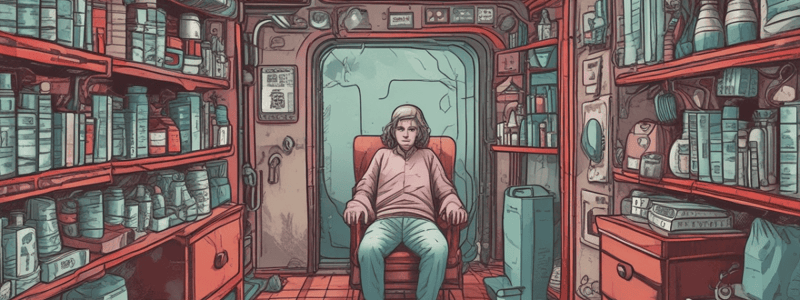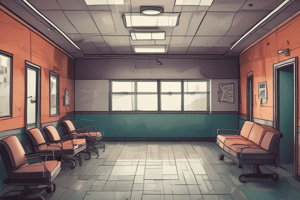Podcast
Questions and Answers
What is the primary concern when responding to psychiatric emergencies?
What is the primary concern when responding to psychiatric emergencies?
- Determining the patient's mental health diagnosis
- Personal safety of patients and responders (correct)
- Treating the patient's underlying medical condition
- Administering an antidote for potential overdose
What should be avoided when restraining a patient with a psychiatric emergency?
What should be avoided when restraining a patient with a psychiatric emergency?
- Applying a NRBM to the patient's face
- Calling for police assistance
- Using a supine or recovery position
- Placing the patient in a prone or face-down position (correct)
What should be done if the patient is spitting during a psychiatric emergency?
What should be done if the patient is spitting during a psychiatric emergency?
- Restrain the patient in a prone or face-down position
- Call for police assistance
- Administer a sedative to calm the patient
- Apply a NRBM to the patient's face with O2 at 15 LPM (correct)
What should be considered if the patient is suicidal or homicidal due to suspected mental illness?
What should be considered if the patient is suicidal or homicidal due to suspected mental illness?
What should be ruled out when responding to a psychiatric emergency?
What should be ruled out when responding to a psychiatric emergency?
What should be considered if the patient is uncooperative and places their own wellbeing or the wellbeing of others at risk due to being under the influence of drugs or alcohol?
What should be considered if the patient is uncooperative and places their own wellbeing or the wellbeing of others at risk due to being under the influence of drugs or alcohol?
What is a potential underlying cause of a psychiatric emergency?
What is a potential underlying cause of a psychiatric emergency?
What should be done immediately after securing the scene for a psychiatric emergency?
What should be done immediately after securing the scene for a psychiatric emergency?
What is a precaution that should be taken when dealing with a patient who is spitting during a psychiatric emergency?
What is a precaution that should be taken when dealing with a patient who is spitting during a psychiatric emergency?
What should be considered when dealing with a patient who is under the influence of drugs or alcohol and is uncooperative?
What should be considered when dealing with a patient who is under the influence of drugs or alcohol and is uncooperative?
What should be done if an overdose is suspected during a psychiatric emergency?
What should be done if an overdose is suspected during a psychiatric emergency?
Why is it essential to secure the scene for a psychiatric emergency?
Why is it essential to secure the scene for a psychiatric emergency?
Study Notes
Psychiatric Emergencies
- Psychiatric emergencies can arise from unstable mood disorders, acute psychoses, or acute crises, which may be linked to drug or alcohol abuse.
- Patients with psychiatric issues may also have underlying acute medical conditions.
Patient and Responder Safety
- Personal safety of patients and responders is a primary concern.
Treatment Approach
- Secure the scene by: • Assessing for weapons presence • Evaluating the patient's threat to themselves or others • Determining the need for police assistance
- Perform Universal Initial Adult Patient Assessment / Care
- If the patient is combative, use restraint in a supine or recovery position (avoid prone or face-down position)
Medical Assessment
- Obtain an accurate glucose level and treat as indicated
- Rule out Excited Delirium (refer to Agitated Patient/Excited Delirium Protocol)
- If the patient is spitting, apply a non-rebreather mask (NRBM) with O2 at 15 LPM
Overdose and Toxicity
- If an overdose is identified, consider an antidote
- Contact Poison Control at 1-800-222-1222 for guidance
Mental Health Interventions
- If the patient is suicidal or homicidal due to suspected mental illness, consider the Baker Act
- If the patient is uncooperative and poses a risk to themselves or others due to drug or alcohol influence, consider the Marchman Act
Psychiatric Emergencies
- Psychiatric emergencies can arise from unstable mood disorders, acute psychoses, or acute crises, which may be linked to drug or alcohol abuse.
- Patients with psychiatric issues may also have underlying acute medical conditions.
Patient and Responder Safety
- Personal safety of patients and responders is a primary concern.
Treatment Approach
- Secure the scene by: • Assessing for weapons presence • Evaluating the patient's threat to themselves or others • Determining the need for police assistance
- Perform Universal Initial Adult Patient Assessment / Care
- If the patient is combative, use restraint in a supine or recovery position (avoid prone or face-down position)
Medical Assessment
- Obtain an accurate glucose level and treat as indicated
- Rule out Excited Delirium (refer to Agitated Patient/Excited Delirium Protocol)
- If the patient is spitting, apply a non-rebreather mask (NRBM) with O2 at 15 LPM
Overdose and Toxicity
- If an overdose is identified, consider an antidote
- Contact Poison Control at 1-800-222-1222 for guidance
Mental Health Interventions
- If the patient is suicidal or homicidal due to suspected mental illness, consider the Baker Act
- If the patient is uncooperative and poses a risk to themselves or others due to drug or alcohol influence, consider the Marchman Act
Studying That Suits You
Use AI to generate personalized quizzes and flashcards to suit your learning preferences.
Description
This quiz covers the protocols for responding to psychiatric emergencies, including assessing personal safety, securing the scene, and providing initial care to patients with psychiatric issues.




